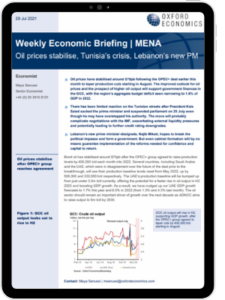MENA | Oil prices stabilise, Tunisia’s crisis, Lebanon’s new PM

Oil prices have stabilised around $75pb following the OPEC+ deal earlier this
month to taper production cuts starting in August. The improved outlook for oil prices and the prospect of higher oil output will support government finances in the GCC, with the region’s aggregate budget deficit seen narrowing to 1.6% of GDP in 2022.
What you will learn from this report:
- There has been limited reaction on the Tunisian streets after President Kais Saied sacked the prime minister and suspended parliament on 25 July even though he may have overstepped his authority.
- The move will probably complicate negotiations with the IMF, exacerbating external liquidity pressures and potentially leading to further credit rating downgrades.
- Lebanon’s new prime minister-designate, Najib Mikati, hopes to break the political impasse and form a government. But even cabinet formation will by no means guarantee implementation of the reforms needed for confidence and capital to return.
Tags:
Related Services

Post
House prices continue to slide for China’s cities
Research Briefing MENA | Oil prices stabilise, Tunisia’s crisis, Lebanon’s new PM While the property market downturn has been universal, the scale and depth has been varied for different cities and regions.
Find Out More
Post
The Construction Productivity Challenge in Australia
Delve into the state of construction productivity in Australia. Understand the factors affecting growth and how innovation can transform the industry for the better.
Find Out More